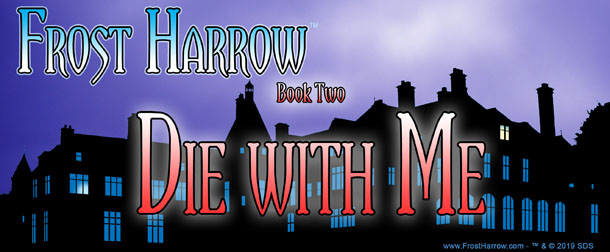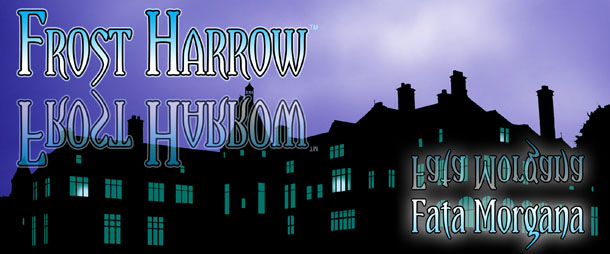
Welcome to FROST HARROW Book 2. (No previous reading required.) Please support my work via Patreon at www.PaySteve.com. Enjoy!
TWENTY-FOUR – TITANIA
Just after the sun peeked over the horizon, Tony Frost pulled his small boat out from underneath the deck on the front of the A-frame. He checked to make sure the engine had plenty of gas, and then dragged the skiff down the beach to the shore.
He went back to the house and found a flashlight, but the batteries were dead. So, he pulled out an old kerosene lantern, made sure it worked, and then stowed it on the boat along with a rope and some other gear.
Realizing he wasn’t dressed for the expedition, he went back into the house again and put on jeans, a heavy sweater, and some good deck shoes. He stuffed a pair of leather work gloves in his pants pocket and fetched a crowbar from downstairs, just in case.
Then he walked to the shore, pushed the boat into the water, and hopped in. He sculled out with the oars a short way, then put the motor down and started it up.
Though the waves were a bit choppy, the boat cut through them with relative ease. Tony’s ship may have been small, but none of the Frosts, not even the frugal Anthony, ever skimped on quality.
He steered toward the dark spot he’d seen on the water several nights before—the place he knew the sandbar to be. Slowly, the Titania began to take shape out of the morning fog.
The ship was larger than Tony expected: some kind of big sailboat, smaller than a yacht, but longer than most of the pleasure craft that regularly plied the waters near Frosthaven. Only the isolation of the area and the bad weather could have kept it a secret for so long. The bow of the ship poked out of the water at a thirty degree angle. The stern remained submerged.
The tatters of a sail hung from the shards of one big mast. The staysail boom remained attached to the mast, though the leading end had snapped loose from its mooring. The boom creaked, and its pointed tip swayed slightly in the morning breeze.
Tony idled the engine down a bit. Even through the morning fog, he could see there was something odd about the Titania. Its paint didn’t look new—its sides were not spotless and clean. It looked like a boat that hadn’t been used in a very long time.
He drew his skiff up to the side, carefully avoiding the submerged sandbar. He found a convenient spot on the railing near the waterline and tied his boat to it.
The railing felt slick with slime. Tony took careful hold of it and hopped aboard, bringing the kerosene lantern, the crowbar, and the rope with him.
He walked uphill to the foredeck, past the broken mast and boom. He discovered a partially submerged topside cabin amidships with windows facing forward and a door on the port side. Tony lit his lantern. The door was stuck, so he kicked it in and ventured inside.
He found no boxes, merely soggy maps, papers, plates covered with seaweed, and a large propane cook stove with extra tanks near the front. The headline on a newspaper caught his eye. The paper was the Chicago Tribune and the headline something about President Ford. Tony could barely read it, but holding the light close, he did make out the date: June 13, 1975.
A cold chill ran through his body. He remembered the Titania now. He’d heard about it when he was a boy. The ship had gone down in a freak storm—more than twenty years ago. How could Glory have come from this ship? Had the recent storm brought the ship up from the bottom? He pushed the thoughts aside, left the cabin, and made his way forward again.
He pulled open a hatch near the prow of the boat. A strange, earthy odor welled up from inside. He lowered the light into the opening and saw boxes—two large ones in the range of his light.
Tony tied his rope to the rail near the hatch and shimmied down it into the hold. His observation from above had been correct; this must be the place.
Two boxes, perhaps six and one half feet long and three feet wide, lay on the wooden decking near the opening. They were sturdily constructed of pine or some other light-colored wood and looked like big, flat shipping crates. A third large box rested further back, near the waterline. There was latched door leading forward, but something near the stern caught his eye—something below the surface of the water, reflecting the light from his lantern.
Tony edged past the boxes toward the water, holding onto his rope as he went. He reached into the chilly liquid and fished out the shining object.
It turned out to be a sliver dagger, in the shape of a cross. The craftsmanship on the piece was exquisite, carefully wrought with delicate traceries. Rubies decorated the hilt; the blade still looked keen. Tony stuffed it in his pocket and crept forward once more.
He unlatched the forward door and inside discovered the object of his search: a plain box made of rosewood. It was heavy, but not so heavy that he couldn’t lift it. He moved it carefully under the hatch and tied it to the end of his rope.
He was about to shimmy up the rope when his curiosity got the better of him. What was in the other three boxes?
Tony didn’t understand why, but he felt it important that he should know—despite Glory’s warning.
He walked to the nearest one, his deck shoes squeaking on the wooden floor, the sound echoing through the hold. He gently pried open the lid.
Inside lay the body of a man: a man Tony recognized as Angel Whyte, the former graffiti artist. That Angel was dead Tony had no doubt. But fresh blood trickled down the side of the tagger’s cold, blue lips.
CONTINUED…
Read the FREE Frost Harrow Halloween stories, too!
“The Weeping Ghost” (2012), “A Trace of Violet” (2013), “Lunchroom Zombies” (2014), “Omens & Visitations” (2015), “Fata Morgana” (2016), and “At the Appointed Hour” (2017), and “Devil’s Lake” (2018), “A Walk on Witches’ Hill” (2019), “The Beast of Bay Road” (2020)

SPECIAL THANKS
To My Credit Creature & Beyond Patrons!
These people have gone above and beyond in their longstanding support of my Patreon (www.PaySteve.com) and the Frost Harrow project.
Thanks so much!
John Appel
Tim Cahoon
David Lars Chamberlain
Paul Curtis
Heath Farnden
Gerald Troy Guinn
Laura Murin
Steve Rouse
Adam Thornton



